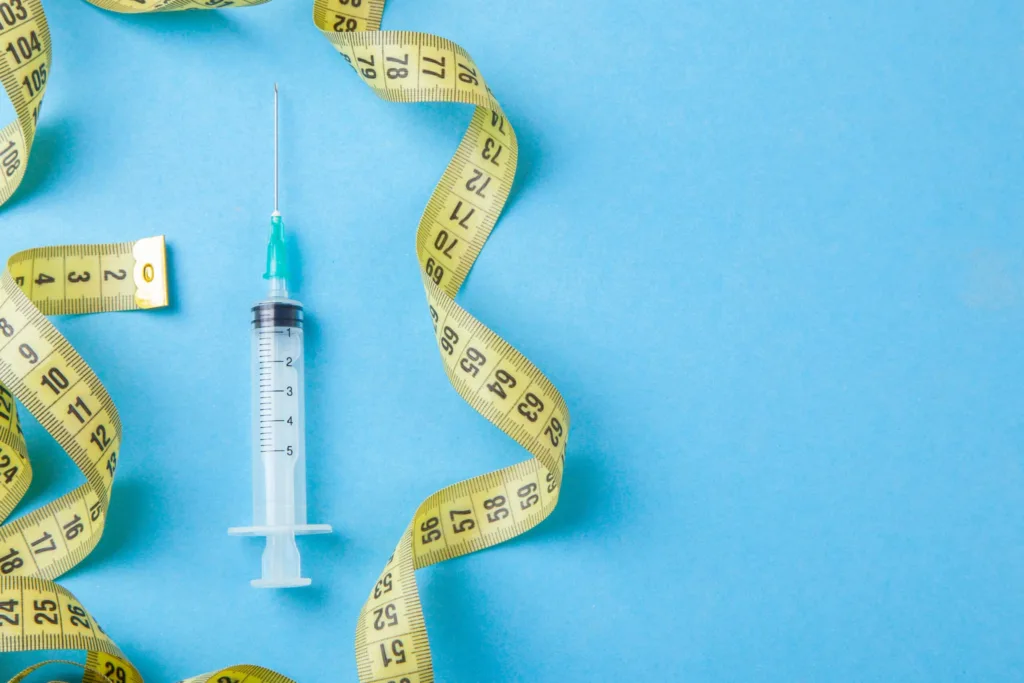Unveiling the Power of B12 Injections
Vitamin B12 is an essential micronutrient that plays a critical role in our overall health and daily functioning. Often referred to as the “energy vitamin”, B12 is involved in several vital processes including energy production, brain function, the formation of red blood cells, and DNA synthesis.
With today’s busy modern lifestyles, many people turn to vitamins and supplements to help maintain optimal health. One rising wellness trend has been B12 injections – an effective way to quickly boost B12 levels right into the bloodstream. With celebrity endorsements and rave reviews, it’s clear that B12 shots are growing in popularity as a way to increase energy, enhance mood, and achieve overall wellbeing.
However, with any health supplement, it’s important to look past the hype and fully examine the proven benefits as well as potential side effects. When making decisions about your health, you deserve transparent, evidence-based information on both the pros and cons of B12 injections.
My goal with this comprehensive blog post is to delve into the science and facts behind B12 shots. We’ll explore the benefits of correcting B12 deficiency, look at proper administration and dosage, and investigate any possible adverse reactions. I’ll also address some common myths floating around about B12 injections so you can separate fact from fiction.
Whether you currently take B12, are considering it, or are simply curious about the trend, you’ll leave this post with in-depth knowledge to empower your decisions around B12 injections. Let’s get started!

Why We Need Vitamin B12
First, what exactly is vitamin B12 and why is it so crucial for the human body?
Vitamin B12 is a water-soluble nutrient naturally found in many animal-based foods. Also known as cobalamin, B12 plays a vital role in several key biological processes that keep us healthy.
Here are some of the main reasons our bodies require adequate B12 levels:
- Energy production – B12 is needed to convert carbohydrates into glucose for energy. It’s also involved in metabolizing fat and protein.
- Brain and nerve function – B12 helps maintain the protective myelin sheath around nerves. It’s also involved in producing neurotransmitters for cognitive function.
- Red blood cell formation – B12 helps make the red blood cells that carry oxygen throughout the body. It ensures healthy cell division and growth.
- DNA synthesis – B12 interacts with folate in the synthesis of DNA and RNA. This maintains genetic integrity.
- Heart health – B12 may support healthy cholesterol levels and lower homocysteine levels linked to heart disease.
In summary, we require sufficient B12 levels to perform at our best each day. Without it we suffer from fatigue, weakness, and even irreversible nerve damage. Now let’s look closer at B12 deficiency.
The Epidemic of B12 Deficiency
With all the crucial roles B12 plays, you may think most people get enough in their regular diets. Shockingly, data reveals the opposite – vitamin B12 deficiency is extremely common, even in developed countries.
Some key facts about the epidemic of B12 deficiency:
- Estimates suggest anywhere from 10-15% of adults are deficient in B12. This figure rises to over 20% in the elderly.
- The most common cause is pernicious anemia – an impaired ability to absorb B12 from foods. This affects over 1% of the general population.
- Vegans and vegetarians are highly susceptible since B12 is mainly found in meat, eggs, and dairy.
- Those with digestive disorders such as Crohn’s or celiac disease often lack proper B12 absorption.
- Chronic alcoholism, smoking, antibiotic overuse, obesity, and other issues also deplete B12 reserves.
- Deficiency can often go undiagnosed for years, building up slowly as stores get used up.
So in summary, B12 deficiency is quite widespread globally for a variety of reasons. Symptoms such as fatigue often manifest gradually, causing the underlying deficiency to be overlooked.

Recognizing B12 Deficiency Symptoms
How can you tell if you’re deficient in this essential vitamin? Recognizing the wide-ranging symptoms of B12 deficiency is key.
Here are some of the most common warning signs:
- Weakness and chronic fatigue
- Impaired brain function and memory
- Numbness or tingling in extremities
- Glossitis – inflamed tongue
- Depression, mood changes, irritability
- Shortness of breath, dizziness
- Headaches and migraines
- Poor balance and coordination
- Pallor, pale skin tone
Deficiency can also lead to macrocytic anemia, during which red blood cells become enlarged. Symptoms of anemia include:
- Rapid heartbeat
- Jaundice
- Chest pain
- Cold hands and feet
Extended B12 deficiency can cause irreversible nerve damage, vision loss, infertility, heart problems, and psychiatric disorders. Most symptoms develop gradually over months or years. Diagnosing the underlying B12 deficiency is critical to halting and reversing the problems it can cause throughout the body.
The Promise of B12 Injections
For individuals diagnosed with or at risk of B12 deficiency, supplementation is necessary to restore adequate levels. Oral B12 tablets or sublingual drops are common. However, an increasingly popular alternative is B12 injections.
B12 shots deliver this vital vitamin directly into the bloodstream via intramuscular injection. This allows for complete and rapid absorption compared to oral methods that depend on the digestive system and may not be as effective, especially in those with absorption issues.
There are several key benefits that make B12 injections an attractive treatment option:
- Fast results – Improvement of deficiency symptoms within weeks
- Targeted delivery – Directly boosts blood levels of B12
- Lasting effects – B12 gets stored in the liver, muscle and other tissues
- Greater bioavailability – Up to 90% absorption compared to just 10% with oral B12
- Fewer visits – Injections required far less frequently than daily pills
- Easy administration – Can be provided by a healthcare professional
While optimal dosage and frequency varies individually, properly administered B12 shots can be a game-changer for deficiency. When your body lacks this critical micronutrient, restoring it via injection can lead to immense benefits. Let’s analyze the research on outcomes.

The science-backed benefits
Hundreds of studies validate the power of B12 injections to reverse deficiency and improve symptoms across bodily systems. Let’s analyze some of the evidence-based benefits:
Increased energy levels
Because B12 plays such a major role in energy production, fatigue is one of the most common deficiency symptoms. Studies demonstrate significant boosts in energy after B12 injections.
- A 2018 study found 98% of subjects had improved energy levels within one month of starting B12 shots along with vitamin C and lipotropic nutrients.
- A 2015 review showed that daily fatigue was decreased in 87% of patients and completely resolved in 29% following B12 injection therapy.
Enhanced cognitive function
Decreased brain function is another common result of B12 deficiency. Research confirms the ability of B12 shots to sharpen focus, improve memory and protect cognitive health.
- A 2021 study showed just 3-weeks of high-dose B12 injections markedly improved cognitive scores in deficient older adults.
- Multiple studies demonstrate B12 supplementation can slow or reverse cognitive decline in dementia patients as well improve mood disorders like depression.
Strengthened immunity
By supporting red blood cell production and cellular energy pathways, optimal B12 levels keep the immune system strong.
- A 2020 report showed B12 injections increased neutrophils, lymphocytes and IgG antibodies – all vital components of the immune response.
- Research also demonstrates the importance of B12 to healthy T-cell and Natural Killer cell production – two key fighters of infection.
Protection of neurological function
Long-term or severe B12 deficiency can damage nerves and neurological tissue leading to permanent problems. Studies confirm B12 injections can halt and reverse this nerve degeneration.
- A 2017 study showed significant improvement and regeneration of damaged myelin sheaths in B12 deficient patients following injection therapy.
- Multiple randomized clinical trials prove combining B12 injections with medication provides major recovery of diabetic nerve damage compared to medicine alone.
Improved heart health
Higher levels of homocysteine are linked to increased risk of stroke, blood clots and heart attack. B12 plays a role in the metabolism of homocysteine and regulates its levels.
- A 2013 report details how B12 injections decreased homocysteine concentrations by 15% over 180 days for significant heart protection.
- Research also shows B12 supplementation in deficient patients substantially lowers LDL cholesterol while raising HDL cholesterol.
In summary, studies across medical fields provide robust evidence that B12 injection therapy can reverse deficiency and substantially improve health from head to toe.
Different Types of B12 Injections
If you’re considering B12 injections, it’s important to understand the different forms available. Let’s take a quick look:
Cyanocobalamin – This is the synthetic form of B12 typically found in fortified foods and oral supplements. It easily converts to active B12 coenzymes in the body. Lower production costs make it the most common type used.
Methylcobalamin – The biologically active form of B12. Requires no conversion so is immediately bioavailable for cellular use. Considered superior for nerve and brain function.
Hydroxocobalamin – This form has enhanced stability and extra availability due to its attached hydroxo group. Provides sustained release of B12 over time.
Adenosylcobalamin – The coenzyme form of B12 utilized in the mitochondria for energy metabolism. Enhances cellular B12 uptake. The most expensive to manufacture.
While all forms effectively treat deficiency, methylcobalamin and hydroxocobalamin are typically recommended as the most potent. Combination formulas are also available. Talk with your doctor about which type is right for your needs.
How to Take B12 Injections
If you and your doctor decide B12 injections are the right form of supplementation, proper administration is vital to achieve results. Here are some key steps to follow:
- Have your doctor test and confirm B12 deficiency with blood work first
- Undergo any appropriate medical exams to diagnose the underlying absorption issues
- Consult your doctor to determine optimal type of B12, dose, injection schedule and length of treatment.
- Follow sterile procedures and have a nurse or doctor administer the injections. Rotate injection sites.
- Inject into large muscles – typically the shoulder, thigh, hip or glute.
- Start with a more frequent injection schedule (weekly or bi-weekly) and taper frequency as levels improve.
- Notice benefits after 3-4 weeks as B12 levels are replenished, providing the energy boost.
- Evaluate your progress with follow up blood work and adjust dosage as needed.
With professional medical guidance, B12 injections are easy to incorporate into your wellness plan. Take care to inject properly using sterile technique and by rotating injection sites. With the right protocol, you’ll be back to your energetic, healthy self in no time.
What About Risks or Side Effects?
As with any medical treatment, it’s reasonable to have some concerns about risks or side effects from B12 injections. However, when administered correctly under medical supervision, adverse reactions are very minimal. Let’s break it down:
Local Reactions at Injection Site
- Mild soreness, bruising or redness may occur but resolves quickly. Using proper injection technique minimizes discomfort. Rotate sites.
Systemic Effects
- Small percentage may experience nausea, headaches or dizziness – usually mild and temporary. Staying hydrated helps.
- Loose stools or diarrhea may rarely occur as body adjusts. Resolves on own or with dose adjustment.
Allergic Response
- Very rare. Mild itching, hives, rash possible. Discontinue treatment if this develops.
Complications from Improper Administration
- Incorrect injection procedures could lead to nerve injury or abscess. Extremely rare if performed by a qualified professional.
Interaction with Medications or Health Conditions
- Those with Leber’s disease, a rare genetic eye condition, should not take B12 injections due to potential damage to the optical nerve.
- May interact with heart conditions, gout, or seizure disorders. Check with doctor.
The key point is that under proper medical supervision, B12 injections demonstrate an excellent safety profile with minimal risk. Still, discuss your medical history with your doctor beforehand to be safe. Mild side effects typically dissipate quickly.

Debunking Myths and Misconceptions
Now that we’ve covered legitimate benefits and potential risks, let’s separate fact from fiction on some questionable claims about B12 injections.
Myth: B12 Injections Cause Weight Loss
Reality: There is no scientific evidence that B12 injections alone will cause weight loss. The energy boost may help patients follow an exercise plan. But B12 does not speed metabolism or burn fat.
Myth: The More B12 the Better
Reality: Excessively high doses provide no additional benefits. The body only absorbs the B12 it needs. Megadoses may actually cause adverse reactions.
Myth: B12 Injections are a Miracle Cure
Reality: B12 injections specifically treat deficiency. But they cannot cure other complex medical conditions or override poor lifestyle habits.
Myth: You Can Skip Dietary B12 if Getting Injections
Reality: Those without deficiency still require B12 from food for overall health. Injections are for treating deficiency only.
The bottom line, be wary of hyperbole. Stick with science. B12 injections have specific benefits for deficiency but are not a panacea. Your doctor can guide you to reasonable expectations.
Should You Consider B12 Injections?
We’ve just taken a deep dive into the documented benefits of B12 injections for treating deficiency, how they work, proper administration, and myths vs. facts. Now the big question – are B12 injections right for you? Here are some key points to consider:
Have You Tested Low in B12?
Before considering B12 injections, it’s vital to confirm an actual deficiency with blood work first. Measure serum B12 and MMA levels to assess your status.
Do You Have Absorption Issues?
Those with gut disorders preventing B12 absorption or who follow strict vegan diets respond best to B12 shots. Consult your doctor.
Compare Benefits vs. Risks
For those deficient, B12 injection benefits typically far outweigh potential side effects which are mild. Discuss thoroughly with your doctor.
Follow Medical Guidance
Work with your doctor to determine if you need injections or oral B12, the best type, dosage and schedule. Let your unique health status guide decisions.
Combine with Healthy Lifestyle
B12 injections alone cannot override poor diet, lack of exercise, smoking or excessive alcohol. Strive to make positive lifestyle changes too.
While B12 injections offer exciting benefits for those deficient, they aren’t right for everyone. Have an open and honest discussion with your medical provider about whether they could be helpful for your situation.
The Takeaway – Knowledge is Power
Thank you for joining me today as we took a deep dive into the science-backed benefits of B12 injections along with potential side effects. Here are the key takeaways:
- B12 is an essential nutrient crucial for energy, brain health, nerves and cell development. Deficiency is extremely common.
- B12 injections – administered under medical supervision – can correct deficiency faster and more effectively than oral methods.
- Research shows injections benefit energy, cognition, immunity, nerves and heart health by elevating B12 status.
- When properly administered, side effects are mild and uncommon. However some precautions may be needed.
- If deficient due to absorption issues, B12 injections can be life-changing – but they’re not a magic bullet and require lifestyle support.
Armed with the thorough information this post provides about the pros and cons of B12 injections, you now have the power to make fully informed decisions regarding your health. As with any wellness practice, transparency is key.
Here’s to your journey to energy, health and happiness!
Thank you for reading this post, don't forget to subscribe to our free newsletter
!

